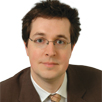|
Carsten Hoyer-Klick
Head of Department
Systems Analysis & Technology Assessment
DLR
Germany
Biography
Carsten Hoyer-Klick earned its diploma in physics at the University of Oldenburg (Germany) with a thesis on modeling concentrating solar power plants in 1998. He then continued to work in the energy meteorology group of the University and worked on the assessment of solar resources from satellite data. In 2003 he changed to DLR to develop the SOLEMI (Solar Energy Mining) data base. The SOLEMI data base contains a complete copy of the EUMETSAT raw satellite data and covers Europe, Africa and large parts of Asia (except the far east). Within this work he was active in UNEP’s SWERA (Solar and Wind Energy Resource Assessment Programme) and the IEA Task on “Solar Resource Knowledge Management”. He is one of the coordinators of the Global Atlas for renewable energies developed within the Clean Energy Ministerial Processa and hosted by IRENA the International Renewable Energy Agency. Since 2009 he is one of the two acting heads of the department Systems analysis and Technology assessment, which focusses on the assessment of future energy systems on the national and international scales.
Abstract
The IRENA Global Atlas for Renewable Energies, development of the portal within GEOSS and GMES
The global atlas for renewable energies will join several ongoing activities on global resource mappings starting from solar and wind energy and collection of socio economic and policy data to develop a central portal for accessing information related to renewable energy resources. Averaged resource data (annual and monthly for solar and wind climate statistics) will be available free of charge to foster solar and wind energy development on a global scale. The portal has a very flexible architecture based on the standards of GEOSS. It is able to discover and view renewable resource data within the GEOSS framework and has the ability to incorporate OGC compatible webprocessing services for further processing and analysis of the data. A few application examples are already within the portal. The portal development was supported by two European projects (EnerGEO and Endorse) which are part of the EU GMES programme.
|

